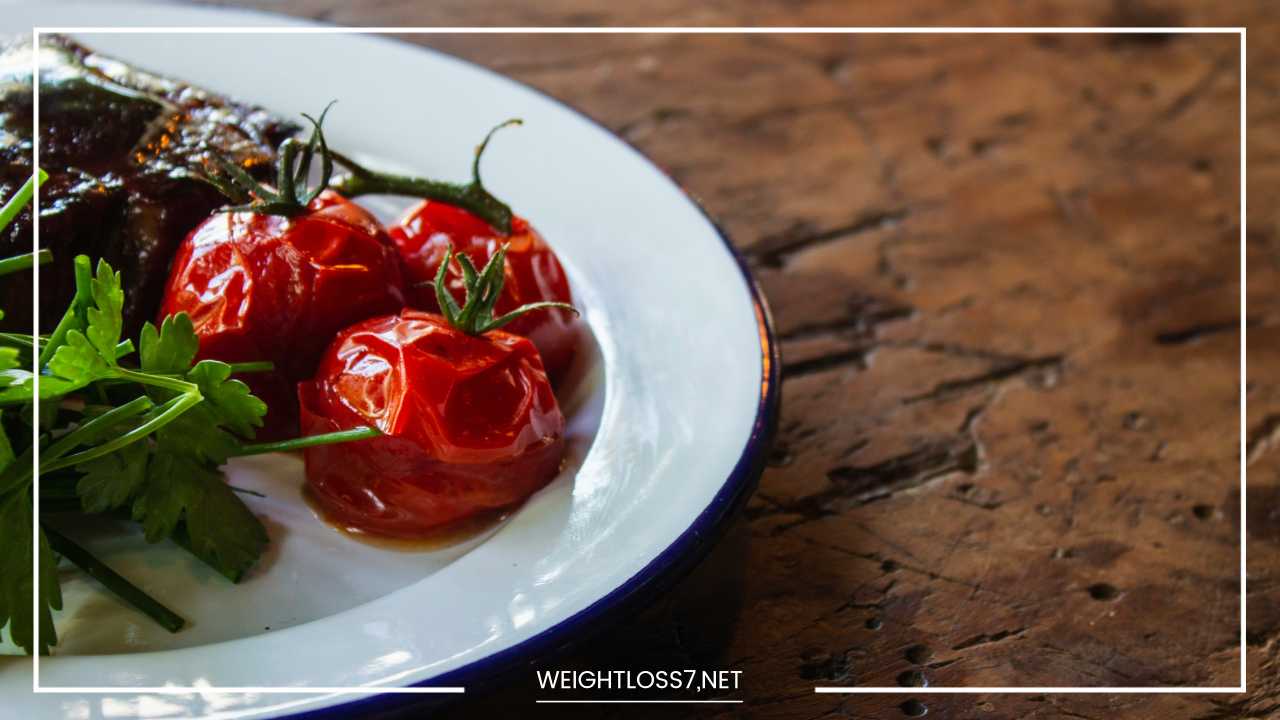5 Healthy Tips to Try When Dieting

Health Tips
5 Healthy Habits to Cultivate a Thriving Weight Loss Journey
Dieting. The word itself can evoke feelings of restriction, deprivation, and bland, repetitive meals. But what if your weight loss journey could be about embracing nourishment, cultivating healthy habits, and feeling empowered?
It absolutely can! By shifting your focus towards sustainable changes that enhance your well-being, you can not only reach your weight loss goals but also develop a positive and balanced relationship with food.
This guide explores five key tips to transform your dieting mindset and support a healthy, thriving weight loss journey:
Tip #1: Make Fruits and Veggies the Stars of Your Plate
Fruits and vegetables are the vibrant champions of a healthy diet. They’re bursting with essential vitamins, minerals, and fiber, a powerhouse trio that keeps you feeling fuller for longer. This translates to reduced cravings and helps prevent overeating.
-
Embrace the Rainbow: Imagine your plate as an artist’s canvas. Fill it with a vibrant array of colors from fruits and vegetables! Each color boasts a unique range of nutrients, so strive for variety. Think leafy greens like kale and spinach, juicy berries packed with antioxidants, bright orange carrots rich in beta-carotene, and deep red tomatoes bursting with lycopene.
-
The Power of Half: Here’s a simple strategy to incorporate more vegetables into your meals: aim to fill half your plate with non-starchy vegetables at every lunch and dinner. This ensures you get a good dose of essential nutrients and fiber without feeling overwhelmed.
-
Snacking Made Easy: Fruits and vegetables are nature’s perfect grab-and-go snacks! Pre-wash and chop your favorites like carrots, celery, cucumbers, and bell peppers for easy access throughout the day. Pair them with a handful of almonds or a dollop of hummus for an extra boost of protein and healthy fats.
Tip #2: Choose Whole Grains Over Refined Grains for Lasting Energy
Whole grains are another dietary superstar. They are packed with fiber, complex carbohydrates, and essential nutrients that keep you energized throughout the day and feeling satisfied.
Refined grains, on the other hand, have been stripped of most of their nutritional value during processing.
This leaves them with a higher glycemic index, which can lead to blood sugar spikes and crashes, leaving you feeling sluggish and prone to cravings.
-
Brown vs. White: A Simple Swap: Make a simple switch from white bread, rice, and pasta to their whole-grain counterparts. Brown rice, whole-wheat bread, and quinoa are all delicious and nutritious options that will provide sustained energy and keep you feeling fuller for longer.
-
Become a Label Detective: Don’t be fooled by marketing claims! Develop the habit of reading food labels carefully. Look for the words “whole grain” at the beginning of the ingredient list. This indicates that the grain hasn’t been refined and retains its full nutritional value.
-
Explore the Ancient Grain Adventure: Don’t limit yourself to just brown rice and whole-wheat bread! Explore the exciting world of ancient grains like amaranth, quinoa, and farro. They offer a delightful variety of textures and flavors that can elevate your meals. Experiment with them in salads, pilafs, or even breakfast porridge for a taste bud adventure.
Tip #3: Protein Power – Your Key to Satiety and Strength
Protein plays a critical role in building and maintaining muscle mass. Muscle, unlike fat, burns more calories even at rest, contributing to an increased metabolic rate.
This translates to more calories burned throughout the day, even when you’re not actively exercising. Additionally, adequate protein intake keeps you feeling fuller for longer, reducing cravings and helping with portion control.
-
Lean and Mean Protein Choices: Focus on lean protein sources like grilled chicken or fish, skinless turkey breast, legumes (beans and lentils), tofu, and tempeh. These options are lower in fat and calories compared to their high-fat counterparts, allowing you to enjoy the benefits of protein without compromising your weight loss goals.
-
Portion Perfection: A good rule of thumb for protein serving size is about 3-4 ounces, roughly the size of your palm. This ensures you get enough protein to feel satisfied without exceeding your daily calorie needs.
-
Spice Up Your Protein Routine: Don’t be afraid to experiment with different protein sources and seasonings to keep your meals interesting. Explore marinades, herbs, spices, and ethnic flavors to transform your protein routine. For example, try a Moroccan-inspired chicken with turmeric, cumin, and coriander, or a Thai-style salmon with ginger, lemongrass, and chili flakes.
Tip #4: Embrace Healthy Fats – Don’t Fear Them!
Healthy fats are not the enemy of weight loss! In fact, they are essential for a balanced diet. They play a vital role in hormone regulation, nutrient absorption, and satiety (feeling full).
Contrary to popular belief, including healthy fats in your diet can actually aid in weight loss by promoting feelings of fullness and reducing cravings.
-
Fats that Matter: Focus on incorporating healthy fats from sources like avocados, nuts (almonds, walnuts, cashews), seeds (flaxseeds, chia seeds, pumpkin seeds), olive oil, and fatty fish (salmon, sardines, mackerel). These options are rich in essential fatty acids and offer a range of health benefits.
-
The Drizzle, Not the Downpour: Use healthy fats for cooking, drizzling, and adding flavor to your meals, not for drenching. Remember, even healthy fats are calorie-dense, so moderation is key. A tablespoon of olive oil provides a good amount of healthy fats for most dishes.
-
Snack Smart with Healthy Fat Pairings: Pair healthy fats with complex carbohydrates for a satisfying and balanced snack. This combination helps regulate blood sugar and keeps you feeling fuller for longer. Try apple slices with almond butter, carrot sticks with hummus, or a handful of berries with a dollop of Greek yogurt.
Tip #5: Become a Hydration Hero – Water is Your Best Friend
Water is the foundation of life, and it plays a crucial role in weight loss. When you’re dehydrated, your body can often misinterpret thirst cues as hunger pangs, leading to overeating. Staying hydrated can also help curb cravings and boost your metabolism.
-
Aim High, But Listen to Your Body: While the common recommendation is to drink 8 glasses of water per day, individual needs may vary. A good way to gauge hydration is by monitoring your urine color. Aim for pale yellow, not dark yellow. If you find yourself frequently thirsty or your urine is consistently dark colored, you may need to increase your water intake.
-
Flavor Boost: Plain water can sometimes feel monotonous. Add slices of cucumber, lemon, or berries to your water for a refreshing twist. Consider incorporating herbal teas like peppermint or ginger tea for a change of pace. Opt for unsweetened varieties to avoid adding unnecessary calories.
-
Carry a Water Bottle: Invest in a reusable water bottle that you can carry with you throughout the day. This serves as a constant reminder to sip on water regularly and stay hydrated. There are many stylish and functional water bottles available, so find one that you enjoy using and that fits your lifestyle.
Bonus Tip: Cultivate a Mindful Eating Practice
Mindful eating is the practice of paying attention to your body’s hunger and fullness cues while enjoying the taste and experience of food. It allows you to develop a healthy relationship with food and make conscious choices about what you eat.
-
Slow Down and Savor: In our fast-paced world, it’s easy to eat mindlessly while watching TV, working on the computer, or scrolling through social media. Make a conscious effort to slow down during meals. Put away distractions, focus on the food in front of you, and savor each bite. Notice the different textures, flavors, and aromas.
-
Listen to Your Body: Our bodies are incredibly intelligent and communicate our needs through hunger and fullness cues. Learn to recognize these cues. Pay attention to when you start feeling hungry and stop eating when you feel comfortably full, not stuffed.
-
Enjoy the Experience: Food is meant to be enjoyed! Don’t deprive yourself of the occasional treat. The key is to practice moderation and mindful indulgence. Savor a small piece of dark chocolate or enjoy a bite of your favorite dessert, but do so consciously and appreciate the experience.
Remember: Weight loss is a journey, not a destination. Embrace the process and focus on making sustainable changes that you can incorporate into your lifestyle for the long term.
Celebrate your non-scale victories – increased energy, improved mood, better sleep – alongside the numbers on the scale.
By adopting these healthy habits and cultivating a positive relationship with food, you can create a sustainable weight loss journey that empowers you to reach your goals and thrive.
Beyond the Plate: Cultivating a Holistic Approach to Weight Loss
While a healthy diet is a cornerstone of weight loss, it’s just one piece of the puzzle. For a truly sustainable and successful journey, consider incorporating these additional tips that address other aspects of your well-being:
Tip #6: Embrace Regular Physical Activity
Exercise is a powerful tool for weight loss and overall health. It helps you burn calories, build muscle mass, and improve your cardiovascular health. The good news is that you don’t need to spend hours at the gym to see results.
-
Find Activities You Enjoy: The key to sticking with an exercise routine is to find activities you genuinely enjoy. Do you love dancing? Try a Zumba class or salsa lessons. Are you a nature enthusiast? Explore hiking or biking trails. Is swimming your happy place? Hit the pool for some refreshing laps.
-
Start Slow and Gradually Increase Intensity: If you’re new to exercise, begin with short, manageable workouts and gradually increase the duration and intensity as your fitness level improves. Aim for at least 150 minutes of moderate-intensity exercise or 75 minutes of vigorous-intensity exercise per week.
-
Make it a Part of Your Routine: Schedule your workouts like important appointments and treat them with the same respect. Find an exercise buddy for extra motivation and accountability.
Tip #7: Prioritize Quality Sleep
Sleep deprivation can wreak havoc on your weight loss goals. When you’re sleep-deprived, your body produces more ghrelin (the hunger hormone) and less leptin (the satiety hormone), leading to increased hunger and cravings. Aim for 7-8 hours of quality sleep each night.
-
Create a Relaxing Bedtime Routine: Develop a relaxing bedtime routine that signals to your body it’s time to wind down. This could include taking a warm bath, reading a book, or practicing light stretches. Avoid screen time for at least an hour before bed, as the blue light emitted from electronic devices can interfere with sleep.
-
Optimize Your Sleep Environment: Ensure your bedroom is cool, dark, and quiet. Invest in blackout curtains, a comfortable mattress, and pillows that provide proper neck support.
-
Limit Caffeine and Alcohol Intake: While a morning cup of coffee can be a great way to start your day, be mindful of your overall caffeine intake throughout the day, especially in the afternoon and evening, as it can disrupt sleep patterns. Similarly, limit alcohol consumption, as it can fragment sleep and lead to restless nights.
Tip #8: Manage Stress Effectively
Chronic stress can be a major obstacle to weight loss. When you’re stressed, your body produces cortisol, a hormone that can lead to increased appetite and cravings for unhealthy foods.
-
Identify Your Stressors: The first step to managing stress is acknowledging what triggers it in your life. Are you feeling overwhelmed by work deadlines? Are you struggling with personal relationships? Once you identify your stressors, you can develop coping mechanisms to address them.
-
Relaxation Techniques: Incorporate relaxation techniques like deep breathing exercises, meditation, or yoga into your daily routine. These practices can help calm your mind and body, reducing stress levels and promoting feelings of well-being.
-
Seek Support: Don’t be afraid to ask for help. Talk to a therapist or counselor to develop healthy coping mechanisms for managing stress. Connect with supportive friends and family members who can offer encouragement and a listening ear.
Tip #9: Celebrate Non-Scale Victories
Weight loss is not just about the numbers on the scale. It’s about feeling better, having more energy, and improving your overall health and well-being. Celebrate your non-scale victories along the way!
-
Increased Energy Levels: Notice how you have more energy to tackle your day-to-day activities. You can climb those stairs without feeling winded, or enjoy a longer walk with your dog.
-
Improved Mood and Confidence: As you lose weight and feel healthier, you might also experience a boost in mood and confidence. You might find yourself taking more pride in your appearance and feeling more comfortable in your own skin.
-
Strength and Stamina Gains: Regular exercise can significantly improve your strength and stamina. Celebrate being able to lift heavier weights at the gym or run longer distances with ease.
Tip #10: Embrace a Sustainable Mindset
Weight loss is not a quick fix; it’s a lifelong journey. Focus on developing sustainable habits that you can incorporate into your lifestyle for the long term.
Don’t be discouraged by occasional setbacks. View them as learning experiences and recommit to your goals.
- Find Inspiration: Surround yourself with positive influences. Follow inspiring weight loss journeys on social media (but be mindful of unrealistic portrayals and prioritize qualified sources). Read success stories and motivational articles to stay inspired and motivated.
-
Find an Accountability Partner: Consider having a friend, family member, or even an online weight loss community as an accountability partner. Share your goals, celebrate your victories, and support each other through challenges.
-
Focus on Progress, Not Perfection: There will be days when you slip up or indulge in a treat. Don’t beat yourself up! Focus on making progress, not achieving perfection. Get back on track with your healthy habits at the next meal or workout.
-
Enjoy the Journey: Remember, weight loss should be a journey of self-discovery and empowerment. Focus on the positive changes you’re making in your life and cultivate a sense of gratitude for your body. Celebrate how strong, capable, and resilient you are.
By following these tips and adopting a holistic approach to your weight loss journey, you can create a sustainable lifestyle that supports your well-being and empowers you to reach your goals. Remember, it’s not just about the number on the scale; it’s about feeling your best and living a healthy, fulfilling life.

















